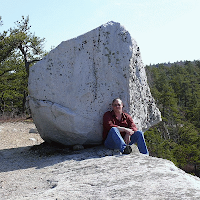Repcheck is a science and economics editor at W.W. Norton and has written an interesting biography of James Hutton - one of the fathers of modern geology. Hutton (1726-1797) was born and lived most of his life in Edinburgh, Scotland during an exciting time known as the Scottish Enlightenment (and he knew such luminaries as David Hume, Adam Smith, James Watt, and Joseph Black). One thing I hadn't realized before was that Hutton was a young man during the Jacobite uprising of Bonnie Prince Charlie of 1745 - it was a tumultuous time.
Any geology course will mention James Hutton and I actually spend almost a full lecture on his ideas in my historical geology class (historical geology is the history of the Earth, but some time is also spent on the historical development of the science of geology). The century between 1750 and 1850 was an interesting time in the history of geology for it marked the time when the traditional Biblical chronology of a recent creation and global flood was replaced by the idea of an ancient Earth with a long history of change.
Why was the traditional Biblical worldview overthrown? It was because people like Hutton started looking at rocks. Observing the process of erosion, slowly reducing rocks to sediments, and reasoning about how certain geology outcrops would have formed. Outcrops, like the famous Siccar Point on the coast of Scotland, exhibiting multiple episodes of erosion, transport of sediments, deposition, lithification, folding, and erosion again. This all takes eons of time.
The rock record shows many transgressions and regressions of seawater and no evidence for a single global flood. Fossils show no evidence of a recent creation of all life or of a global flood. Geologists knew the Earth was ancient long before it was confirmed by radioactive dating in the 20th century.
The book was very good at covering certain things - the exciting happenings in 18th century Edinburgh, some interesting facts of Hutton's life (he appeared to have fathered a child out of wedlock as a young man leading him to leave the country for a time), the history of attempts to work out the age of the Earth (primarily through Scripture) - especially the influential work of Eusebius in 325 CE, the influence of German mineralogist Abraham Werner's ideas of Neptunism (the idea that all rocks, including igneous ones, formed from a primordial global ocean), Hutton's ideas on the evolution of life a century before Darwin, and Hutton's great influence on later geologists like Charles Lyell.
Where the book falls short, in my opinion, is that it never really delves into the geology much. I think casual readers would have benefitted from a discussion of concepts like superposition and cross-cutting as well as a more detailed geologic discussion of features such as Siccar Point and Arthur's Seat that influenced Hutton so much.
Anyway, it reads well and I highly recommend it to anyone interested in the natural sciences.




No comments:
Post a Comment